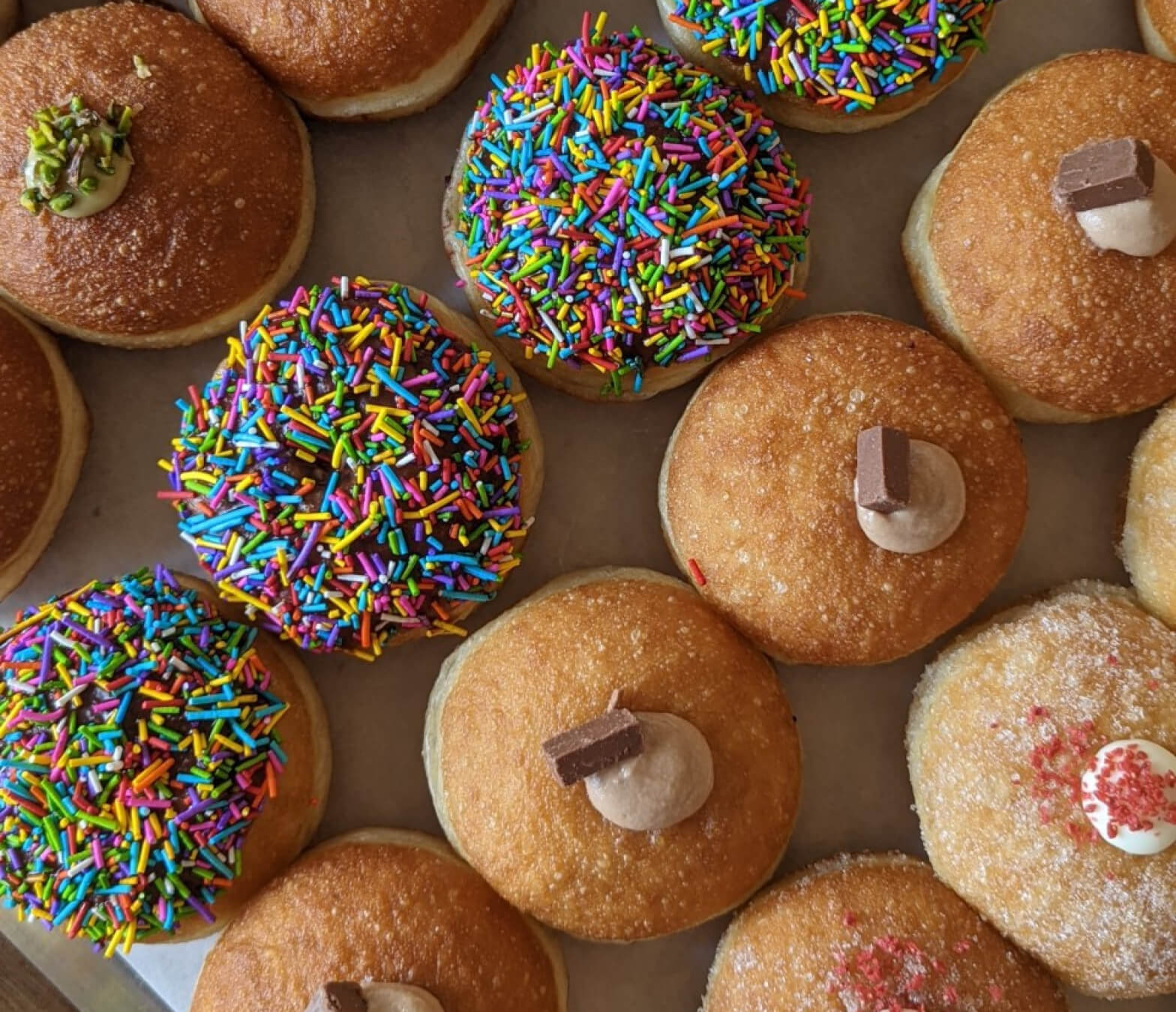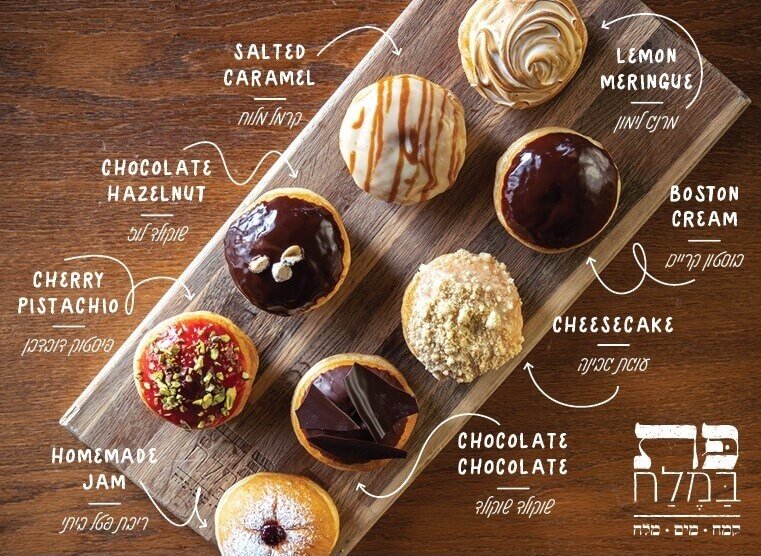Israelis’ cravings for super fancy Hanukkah donuts are intensifying
Expectations for gourmet sufganiyot are high. So are the prices.

Donuts offered for Hanukkah this year at Couronne Patisserie, a bakery on Kibbutz Evron in Israel. Courtesy of Couronne Patisserie
KIBBUTZ EVRON, Israel – Hanukkah’s emblematic dessert is donuts. For many, plain or powdered will do. But increasingly on the Jewish holiday, Israelis — including non-Jews — are demanding more sophisticated sufganiyot, the Hebrew word for the confection.
And though the rising popularity of fancy donuts has not escalated into fierce baking rivalries, national contests or stolen recipe scandals, a bit of one-upmanship has come into play, with Hanukkah-party guests trying to outdo one another by bringing showy holiday desserts. Israeli bakeries roll out their seasonal creations much like designers unveil their new clothing lines each autumn. At least one Israeli bakery calls its Hanukkah offerings a “collection.”

Raneen Rayan and her teenage daughter Mays, Muslim residents of the northern village of Kabul, drove a half-hour on a recent morning to a French bakery on this kibbutz north of Haifa for its donuts.
The six donuts packed for them to take home — chocolate-hazelnut, strawberry, chocolate with sprinkles, lemon, pistachio and vanilla custard — are a far cry from the sufganiyot sameness most Israeli bakeries offered some years ago: powdered sugar-covered dough into which had been injected minuscule squirts of factory-made strawberry jam. That’s what Rayan said her village’s bakery sells. So do numerous others and supermarket chains’ baked-goods departments.
But the Rayans are among the Israeli consumers who seek tastier, more creative and visually appealing sufganiyot which are stealing shelf space from the standard issue Hanukkah dessert.
Rayan said she’d come to the Evron bakery, Couronne Patisserie, two weeks ago to inquire when its donuts would be available.
“I wait each year for Hanukkah for sufganiyot,” said Rayan, for whom the visit was her third consecutive year at holiday time. “There’s art in what they do.”
Eight nights only
The evolution of sufganiyot, derived from the Hebrew word for sponge, reflects the expansion of Israeli palates from foreign travel, television cooking programs’ popularity and donut makers’ exposure to the broader world.
What remains unchanged is sufganiyot hitting the shelves for Hanukkah — and only for Hanukkah. Like latkes, oil-rich sufganiyot are tied to the holiday’s celebration of the olive oil miracle in ancient Jerusalem’s Temple. Israeli bakeries aren’t about to become American-styled Dunkin Donuts, offering more than a dozen flavors year-round. The country’s shops that sell fancy sufganiyot market only a few flavors each season, sometimes withholding or adding new options the following year.

One bakery near Jerusalem, Pat Bamelach (Hebrew for bread in salt), sells 1,000 sufganiyot daily in the days before and during Hanukkah, but its manager and head baker, Meir Shani, said he won’t offer them past the holiday.
“We want to leave something special for next year,” he said. “On Hanukkah we have an opportunity to express our creativity and show people new things they’re not used to.”
This year’s new flavor among the 10 offerings features a pecan-chocolate cream filling and a coffee topping.
And while Israelis are seeking what’s novel, they are also demanding quality. Shani said he takes pride in preparing fillings from scratch. So does Atar Tournois, the owner of the Evron bakery. An over-emphasis on visual appeal can distract from her superior ingredients, she said.
“Sufganiyot have become like a show. You won’t find me using many decorations and colors,” she said. “The taste is the most important of all.”
Fancy prices
The sufganiyot there, and at three other shops a reporter recently visited, don’t come cheap, with some costing 14 or 15 shekels — more than $4.
“It’s a bit expensive, but once in a while is OK,” Rayan said. “It’s nice to treat ourselves.”
The businesses keep their eyes on trends.
Ziv Abramovich, who manages Shany, his family’s six-bakery chain in the Tel Aviv and Haifa areas, said pistachio and chocolate are popular ice cream flavors this year — so the company’s 11 sufganiyot flavors include those two.
As he spoke, customers flowed steadily into his branch on Haifa’s busy Ha’Atzmaut Street. Six sufganiyot trays sat at eye level on the counter. A clerk worked to keep them filled. A woman placed an order for 25 sufganiyot for a family party Sunday night, the holiday’s first. A man who handles freight at the port a block away stopped in for two sufganiyot before rushing back to work.
Opting out
Five doors down, at Cremerie De L’Eclair, the colors in the sweet shop’s baked goods’ display and the adjacent ice cream counter were intensely vivid.
If any Israeli bakery would feature lavishly decorated sufganiyot in appealing presentations, surely this would be it.
Lavishly decorated and colored holiday pastries — yes. Sufganiyot — none.
Given the commercial district’s large Russian and Arab Christian populations, explained Migle Sarauskaite, who was staffing the shop this rainy afternoon, “we decided to do Christmas here this year.”
A customer entered, considered her options and pointed out her choices. Both were about 4 inches tall, and stood on cookie bases. One: pistachio mousse with nut brulée, shaped and colored like a dark-green Christmas tree, with red specks of strawberry jam for the tree’s candied adornments. The other: mascarpone cream cheese with strawberry and white chocolate, resembling a pointy red Santa Claus cap.
She was Zhenna Avshalumov, a Jewish immigrant from Azerbaijan. She and her family run a baked-goods company out of their homes. The Christmasy goodies were pricey: 42 shekels, or $12.35 each.
But she shelled out — a high compliment from one food artist to another.
Avshalumov draws the line at store-bought sufganiyot, though. She said she won’t be purchasing any, fancy though they may be. She’ll bake her own sufganiyot: about 50 for the family’s opening-night party.
“I don’t like to buy them in stores,” she said, adding, seemingly oblivious to the Hanukkah irony, “because they use too much oil.”





















